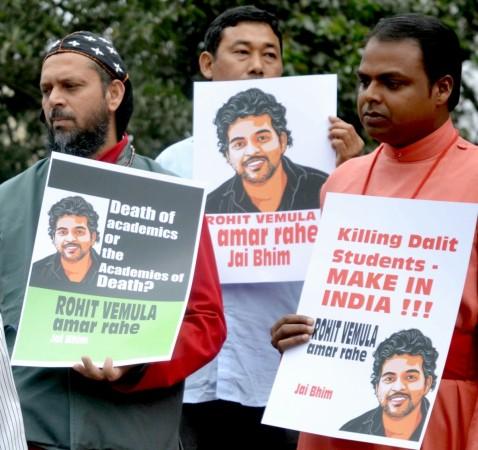
A probe panel set up by the Human Resource Development (HRD) Ministry to probe Rohith Vemula's suicide case has stated that the 26-year-old research scholar at the Hyderabad Central University (HCU) was not a Dalit. The panel had been set up not only to probe his death, but his social identity as well, over which there have been conflicting reports.
While Vemula's father was said to be from the Other Backward Classes, his mother, belonging to the Mala caste, was said to be from the Dalit community.
The report that Vemula, who committed suicide in January this year, was not a Dalit relates to statements made by a couple of Union Ministers - Sushma Swaraj (Minister of External Affairs) and Thaawarchand Gehlot (Minister for Social Justice and Empowerment).
Both ministers had raised doubts over Vemula's identity and had said that he belonged to the Vaddera community - a caste which falls under the Other Backward Classes (OBC) category. They had also said that his suicide was being used to highlight caste discrimination to create tension in the country.
Former Allahabad High Court judge A K Roopanwal had submitted his report to the University Grants Commission (UGC) in the first week of August, UGC sources told the Indian Express.
"I cannot answer your questions. Please direct all your questions on the contents of the report to the government," Roopanwal told the daily.
"We lived like Dalits. We were raised in a Dalit community. Yes, my father was from a backward class, but whatever we know is from our experience of living like a Dalit. We have been discriminated against all our lives. Rohith referred to this in his letter too," said Vemula's brother, Raja, rejecting the report of the probe panel.
Vemula's father, who had separated from his wife belonged to the Vaddera community, while his mother was from the Mala caste, a scheduled caste in Andhra Pradesh. Therefore, the research scholar's caste certificate said that he belonged to the Mala caste, according to a Hindustan Times report.
Vemula's suicide note that was recovered by the police had said: "My birth is my fatal accident. I can never recover from my childhood loneliness. The unappreciated child from my past."
However, the report of the HRD Ministry's probe panel contradicts the report submitted by Guntur District Collector Kantilal Dande to the National Commission for Scheduled Castes (NCSC).
"The District Collector is the final authority in this matter. He has already submitted a report that Vemula was a Dalit. All records and investigations proved he was a Dalit. What was the need for this new committee? I don't know what this new report is all about. The BJP government and its ministers have been trying to prove that he was not a Dalit. Obviously, they want to favour their minister who is facing an FIR. There can't be a bigger example of anti-Dalit mentality by this government," PL Punia, chairman of the NCSC, told IE.
A judicial commission was set by the HRD Ministry in January this year after the university was found responsible for the student's suicide. An FIR lodged by the police also mentioned names of Union Minister Bandaru Dattatreya and HCU vice-chancellor Appa Rao for allegedly abetting his suicide.
Vemula had committed suicide in his hostel room in January 2016. He had been suspended from the University previously. After his suspension was lifted, he was prohibited from entering the dormitories, due to which he had been forced to sleep outside in the cold. His monthly stipend too had been stopped in July 2015.





!['Lip lock, pressure, pyaar': Vidya Balan- Pratik Gandhi shine in non-judgmental infidelity romcom Do Aur Do Pyaar [ Review]](https://data1.ibtimes.co.in/en/full/797104/lip-lock-pressure-pyaar-vidya-balan-pratik-gandhi-shine-non-judgmental-infidelity-romcom.jpg?w=220&h=138)







